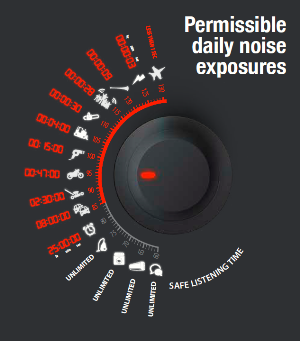Many office-based workers are increasing their time on headphones for meetings, and many of us are listening to music or podcasts more and more using our headphones. It is pertinent to think about how loud the volume is to protect your hearing. Hearing can be damaged by exposure to loud sounds. Once hearing is damaged it won’t come back.
The daily recommended safe volume level of any sound is below 85 decibels (dB) for a maximum of 8 hours. To give a perspective the noise of a hairdryer is 100dB, a lawnmower is 90 dB, a car is 85dB and normal conversation is 60dB.
The average use of personal audio devices (phones with headphones in) is 94dB for one hour. If you turn your headphones to full volume it can go up to as much as 110dB; this will damage your hearing after long term use.
Hearing damage happens over time, but it can be prevented by following some simple rules. So, some top tips to test if you need to turn it down are:
Hold your headphones in front of you
Remove your headphones, keeping them at your preferred volume, and hold them in front of you at an arm’s length. If you can still hear the music clearly it is too loud. Turn it down a bit and repeat until you can’t hear it clearly at arm’s length. Your ears need regular breaks during the day to give them some rest.
Check the volume control
There is no denying that some music [sounds] is best listened to at louder levels. And it’s so simple to crank up the volumes when your favourite track begins to play. It is important, though, to get into positive habits by ensuring that the volume stays below the halfway mark.
If you find it creeping up to over two-thirds of the volume control or over 60%, then it is too much for your ears. Hearing loss may not occur overnight, but you can prevent it from happening by monitoring those volumes on a regular basis.
Ask a friend for assistance
Ask your friend to sit beside you to check if they can hear your music through your headphones. If your music can be overheard distinctly, then it is obviously too deafening for your ears to handle. This test will work better if you are not using open-back headphones as they have a tendency to leak music regardless of the level of volume.
When your friend can easily pick up on sounds while sitting next to you, or even across from you, then it’s time to bring the volume down a couple of notches.
Look out for signs of hearing loss
You may already be experiencing symptoms of hearing loss and don’t realise it. Look out for symptoms such as:
- Ringing, clicking, roaring, hissing or buzzing in the ears
- Difficulty in hearing at rowdy venues
- Muffled sounds
- An increasing need to keep turning the volume up
Get Regular Hearing Check-Ups
As you do with your eyes, get your hearing checked regularly. Shops such as Boots offer tests.
